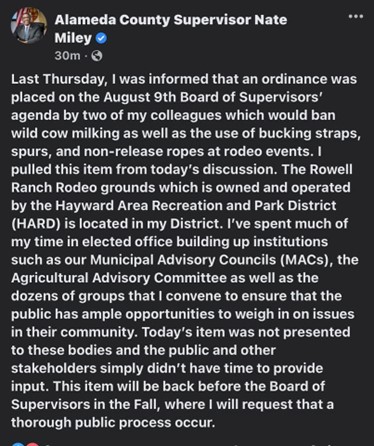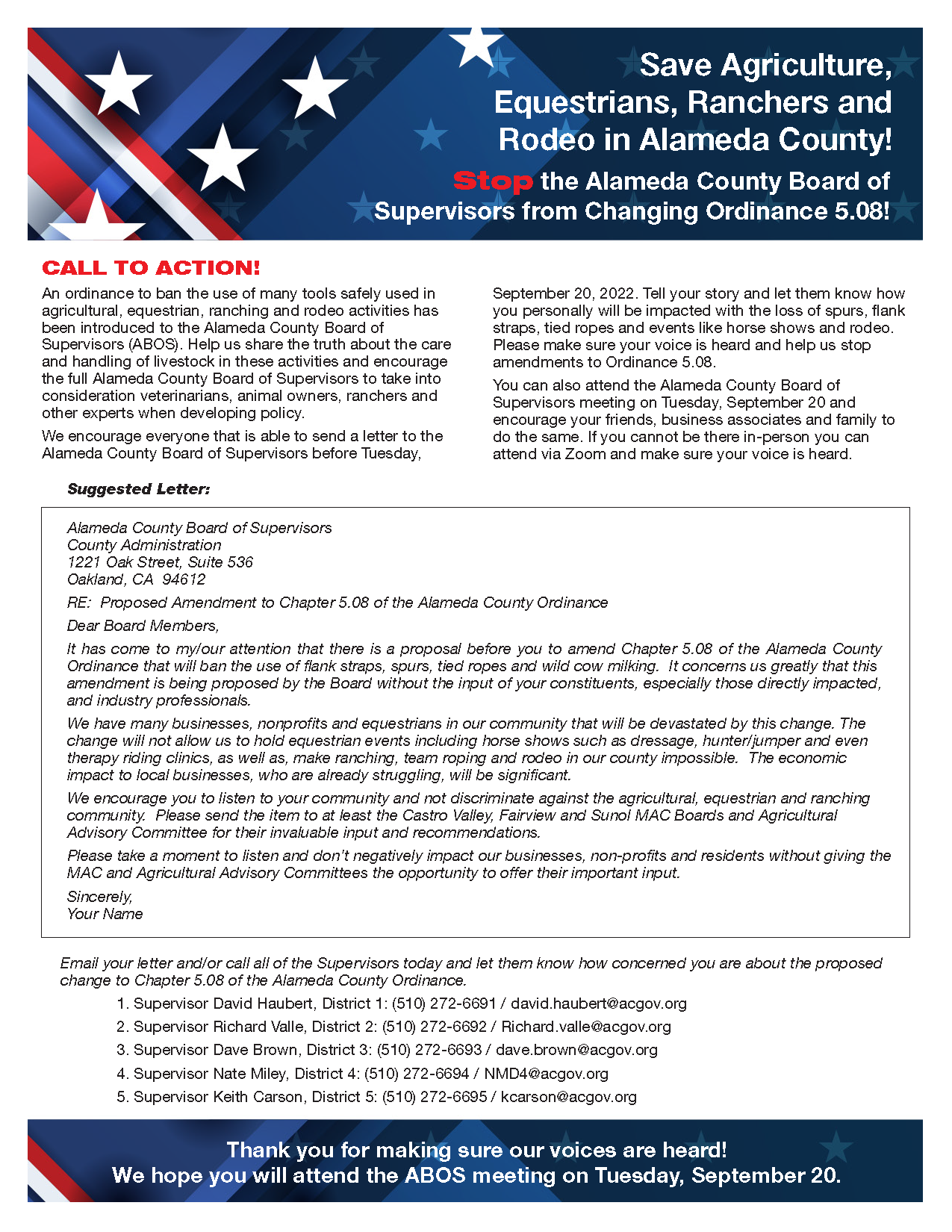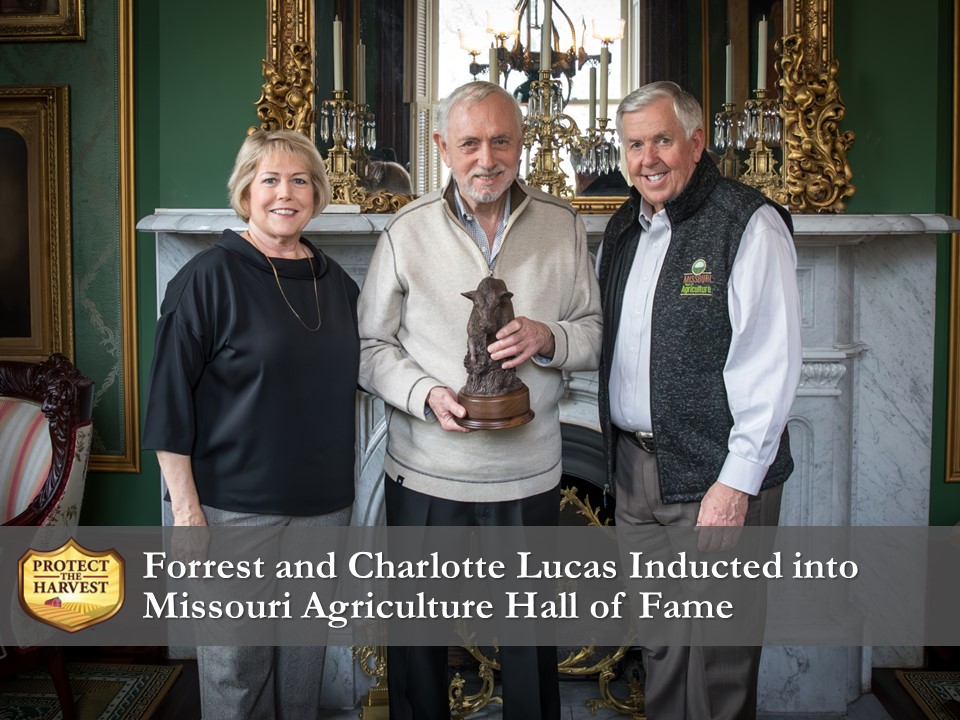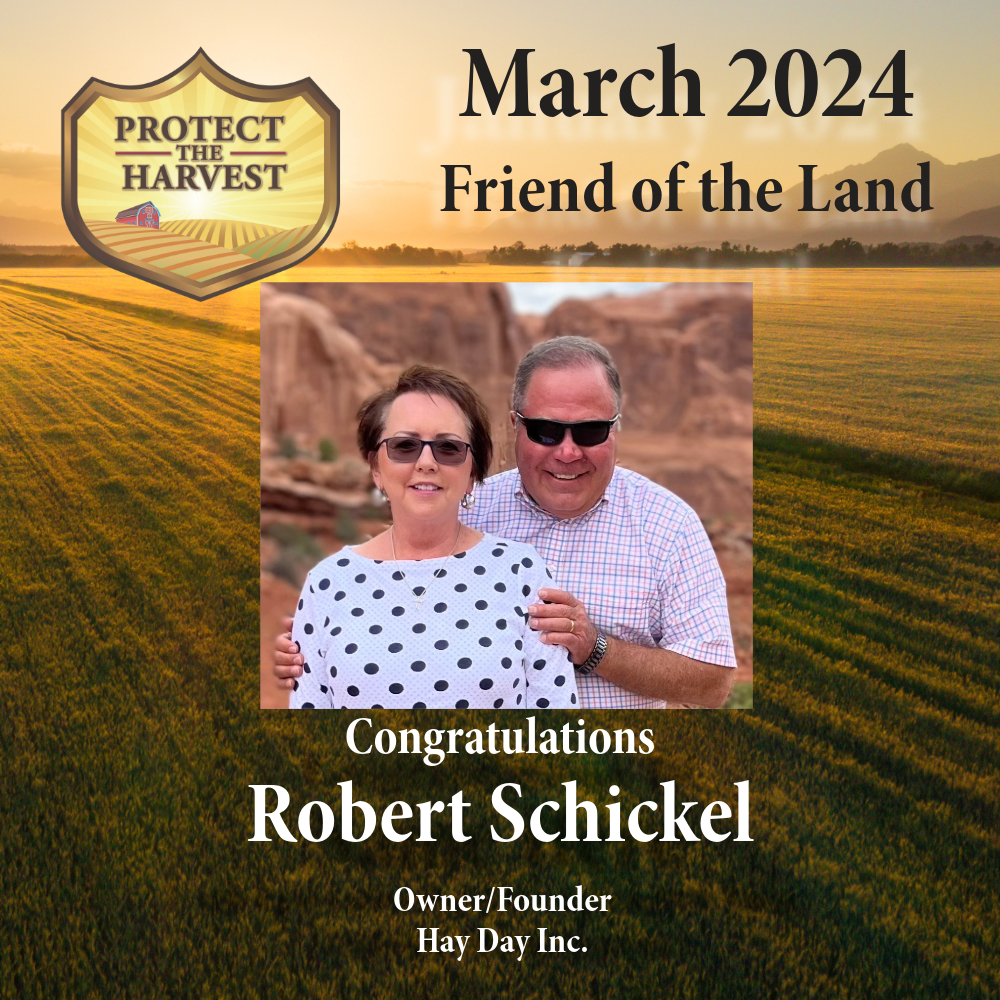RODEO BAN LANGUAGE – ACTION ALERT
Alert – September 20th
Alameda County’s Proposed Rodeo Ban is also a Ban on Livestock Production
September 20th Meeting
On September 20th, the Alameda County Supervisors will meet, and on the agenda is ordinance language that will impact livestock producers, horse enthusiasts, rodeo fans, and children with 4H and FFA projects in the county. Should this ordinance language go into effect, it will set a dangerous precedent that can be used to create similar ordinances across California and the entire country.
The meeting is 9:00 am to 5:30 pm and can be accessed online. The district supervisors need to hear what you think of this ordinance. It’s time to make your voices heard.
-
Contact information and a link to a petition supporting rodeo and livestock production in Alameda County can be found below.
-
Link to a live view of the meeting and meeting agenda can be found below.
-
Link to Alameda County Agriculture Coalition – suggested letter and Coalition sign-up can be found below.
Language of the Ordinance Affects More Than Rodeo
The language of the ordinance doesn’t just affect rodeo, it affects ranching in general and even social events like team roping.
The proposed language reads as follows:
5.08.177 Prohibition of specified devices for equine, bovine, and ovine animals. A. No person shall conduct roping of any equine (including but not limited to, any horse, mare, pony, ass, donkey, burro, mule, or hinny), bovine (including but not limited to, any steer, calf, bull, ox, heifer or cow), or ovine (sheep) animal in any entertainment or sporting event, including a rodeo or practice for a rodeo, with the exception of breakaway roping, where the animal is released immediately after it is roped without the animal being subjected to a sudden stop or fall. B. No person shall use spurs or bucking straps upon any animal during any entertainment or sporting event, including during a rodeo or practice for a rodeo.
Rodeo events mimic skills used on a farm or ranch in livestock production. The ordinance language is broad and encompasses more than just the sport of rodeo, it includes “practice” which is vague and has the potential to be broad sweeping. Animal extremist groups want to push this so they can further their agenda of ending animal agriculture.
On August 9th Two Alameda County Supervisors Tried to Pull the Wool Over Other District’s Rural Constituents
On August 9th, 2022, a regulatory ordinance was to be voted on regarding banning certain events and tools used in rodeo. The two supervisors who presented the ordinance are Richard Valle of District 2 and Dave Brown of District 3. Ironically, Mr. Brown, an appointed member, apparently is not a full-time resident of his district according to a lawsuit filed. In the Aug 2, 2022 edition of the San Jose Mercury News the following statement can be found:
“In the suit, the Alameda County Taxpayers’ Association alleges that Brown was not a resident of Alameda County when he was appointed to fill a vacant seat on the board. The lawsuit may force him to prove in court that he’s a full-time, permanent resident of Oakland despite moving there from Walnut Creek just four days before his appointment last November following the death of his predecessor, Wilma Chan, for whom Brown served as chief-of-staff.
Alameda County requires elected officials to live and be eligible to vote full-time in the districts where they serve for at least one year before they begin their terms.
Counsel Donna Ziegler previously determined those rules don’t apply to Brown because he was appointed and not elected. But the plaintiffs see things differently and argue that Brown doesn’t qualify as a permanent resident of Oakland because he stays one night a week at his Walnut Creek home, where his wife and children still live.”
It should come as no surprise that both supervisors’ districts cover urban, coastal, and some affluent areas and not the bulk of the rural communities.
District 4 Supervisor Objects
District 4 covers the unincorporated town of Castro Valley (historically a large agricultural area with chicken ranches, sheep, cattle, and horses), unincorporated parts of Ashland, Cherryland, El Portal Ridge, Fairmont Terrace, Fairview, and Hill Crest Knolls. It also includes parts of the City of Oakland and Pleasanton as well as the unincorporated communities of Castlewood and Happy Valley.
These areas historically, with the exception of much of Oakland, have always been rural “bedroom” communities or agricultural areas. The easternmost city in Alameda is Livermore, known for its large wineries and vineyards. Pleasanton is home to Alameda County Fairgrounds, which holds 4H and FFA competitions and the annual State Fair as well as horse racing meets.
Rowell Ranch is situated in the hills between Castro Valley and Pleasanton. These hills are more like mountains as they are part of the coastal range. The terrain is rough and perfectly suited to raise cattle and horses. Rowell Ranch is also in District 4 and has the distinction of having put on a rodeo for 100 years.
District 4 Supervisor, Nate Miley, whose area is the one being addressed in the rodeo ban, was rightly upset at the lack of going through proper channels to be voted on.
His statement on Twitter says it all:

Obviously, Supervisor Miley felt that this ordinance was being pushed through without agencies in his district being allowed to comment, nor were stakeholders and the public given sufficient time to submit their input.
Agriculture Plays a Vital Role in Alameda County
When connecting agriculture with California, many people think of California’s fertile Central Valley, but many may not be aware of the East Bay’s Alameda County. It is home to more than 200,000 acres designated for agricultural purposes. The bulk of that land is in the Tri-Valley region of Eastern Alameda County. Tri-Valley encompasses the Amador, Livermore, and San Ramon Valleys, the cities of Dublin, Livermore, and Pleasanton and unincorporated county areas.
If asked, many would assume that it is an urban county, however, Alameda County has had a rich agricultural heritage since it was established in 1853. Even before that, Robert Livermore planted wine grapes in 1840 in what is now known as the Livermore Valley Wine Region. The earliest wineries in California were established in 1883 by the Concannon and Wente families and there are now more than 50 wineries located there.
While wine grapes are the main crops grown, other crops include olives, pistachios, walnuts, and persimmons. The area is also home to cattle ranches owned and operated for generations by local families.
Livermore Rodeo and Rowell Ranch Rodeo are part of this historical area.
Rodeo and Livestock Production are Close Relatives
Rodeo showcases events that mirror life on a ranch. Doctoring sick animals who live on the range requires the ability to rope and tie them. Bronc riding is reminiscent of the feral horses that both the cowboys and Native Americans would rope, break, and then train. Spurs, which are regulated to require that the rowels be filed dull and used loose on horses or loosely locked on bulls, are used as an extension of the leg in all equestrian sports.
One of the first rodeos was presented by Don Guillermo Castro in the early 1800’s. Every spring the gathering, doctoring, and branding of Longhorn cattle also gave the Native American and Mexican cowboys the chance to show off their skills in competitive events at the end of each spring gathering. Gathering required the ability to rope cattle on horseback, wrestle them, tie them and then give them any drenches, medications, or even brand them.
Sometimes, cowboys would find a calf that had been abandoned by its mother and to save the calf, they would have to rope and tie and milk a semi-feral cow to get the valuable colostrum that would give the calf antibodies.
Rodeo History in Alameda County
First established in 1918 by local cattle ranchers to help the Red Cross raise money during World War l, Livermore hosts the “world’s fastest rodeo.”
In 1921 Harry Rowell, a rancher, businessman, and philanthropist revied the historical sport of rodeo in downtown Hayward. In 1925, he produced his first rodeo at his Dublin Canyon ranch, the current home of the Rowell Ranch Rodeo Park.
Both the Livermore Rodeo and Rowell Ranch Rodeos are still annual occurrences that feature competitive events reflecting the western heritage of the diverse cattle ranches in Alameda County.
Agriculture is Still Important in Alameda County
Livermore High School offers the last remaining ag science education program for students in the Alameda County public school system. The curriculum includes classroom and laboratory instruction, supervised agriculture experience programs and Future Farmers of America (FFA) student organizations.
The school has also hosted Agricultural Day programs geared for third graders with demonstrations of tools, equipment, and livestock given by local farmers, ranchers, and high school students.
Alameda County Fair Showcases Ag
Since its birth in 1912, the Alameda County Fair has provided the opportunity for students participating in FFA and 4-H to demonstrate the knowledge they’ve learned, their animal projects, be judged on their projects, and promote agriculture through these projects.
As with other county fairs, the junior livestock exhibit is the highlight.
However, all of this is in jeopardy if two County Supervisors have their way.
Watch the Meeting – Call in to Comment
Live Link to View Alameda County Board of Supervisor’s Meeting and Meeting Agenda HERE
Alameda County Agriculture Coalition Action Page
Link to Action Page HERE

Petition and Commissioner Information:
Sign Petition HERE
Alameda County Commissioner Contact Information
District 1: Encompasses the cities of Dublin and Livermore, most of the city of Fremont, the unincorporated community of Sunol, a portion of the City of Pleasanton, and most of the unincorporated area of the Livermore-Amador Valley.
Supervisor David Haubert
County Office:
1221 Oak Street, Suite 536
Oakland, CA 94612 Map
(510) 272-6691
District Office:
4501 Pleasanton Avenue
Pleasanton, CA 94566 Map
(925) 551-6995
District 2: Encompasses the communities of Hayward, Union City, Newark, and parts of Fremont
Supervisor Richard Valle
County Office:
1221 Oak Street, #536
Oakland, CA 94612
Phone: (510) 272-6692
Fax: (510) 271-5115
District Office
24301 Southland Drive, Suite 101
Hayward, CA 94545
Phone: (510) 670-6150
Fax: (510) 259-0860
District 3: Encompasses the cities of Alameda, San Leandro, a portion of Oakland, including Chinatown, Jack London, Fruitvale, and San Antonio neighborhoods. District 3 also includes the unincorporated communities of San Lorenzo and Hayward Acres.
Supervisor Dave Brown
dave.brown@acgov.org
1221 Oak Street, Suite 536
Oakland, CA 94612 Map
Phone: (510) 272-6693
Fax: (510) 268-8004
District Office
15903 Hesperian Blvd
San Lorenzo, CA 94580 Map
Phone: (510) 278-0367
Fax: (510) 278-0467
District 4: Includes portions of the City of Oakland, the City of Pleasanton including the adjacent Unincorporated Communities of Castlewood and Happy Valley, as well as Ashland, Castro Valley, Cherryland, El Portal Ridge, Fairmont Terrace, Fairview, and Hill Crest Knolls.
Supervisor Nate Miley
County Office:
1221 Oak Street, Suite 536
Oakland, CA 94612
Phone: (510) 272-6694
Fax: (510) 465-7628
Eden Area District Office
20980 Redwood Road, Suite 250
Castro Valley, CA 94546
Phone: (510) 670-5717
Fax: (510) 537-7289
Pleasanton District Office
Heritage House at the Fairgrounds, 2nd Floor
4501 Pleasanton Ave.
Pleasanton, CA 94566
Phone: (925) 803-7959
District 5: Encompasses the cities of Albany, Berkeley, Emeryville, Piedmont, West Oakland, North Oakland, Rockridge, Grand Lake, and portions of the Fruitvale, Manzanita, and Dimond District neighborhoods.
Supervisor Keith Carson
1221 Oak Street, Suite 536
Oakland, CA 94612
Phone: (510) 272-6695
Fax: (510) 271-5151



